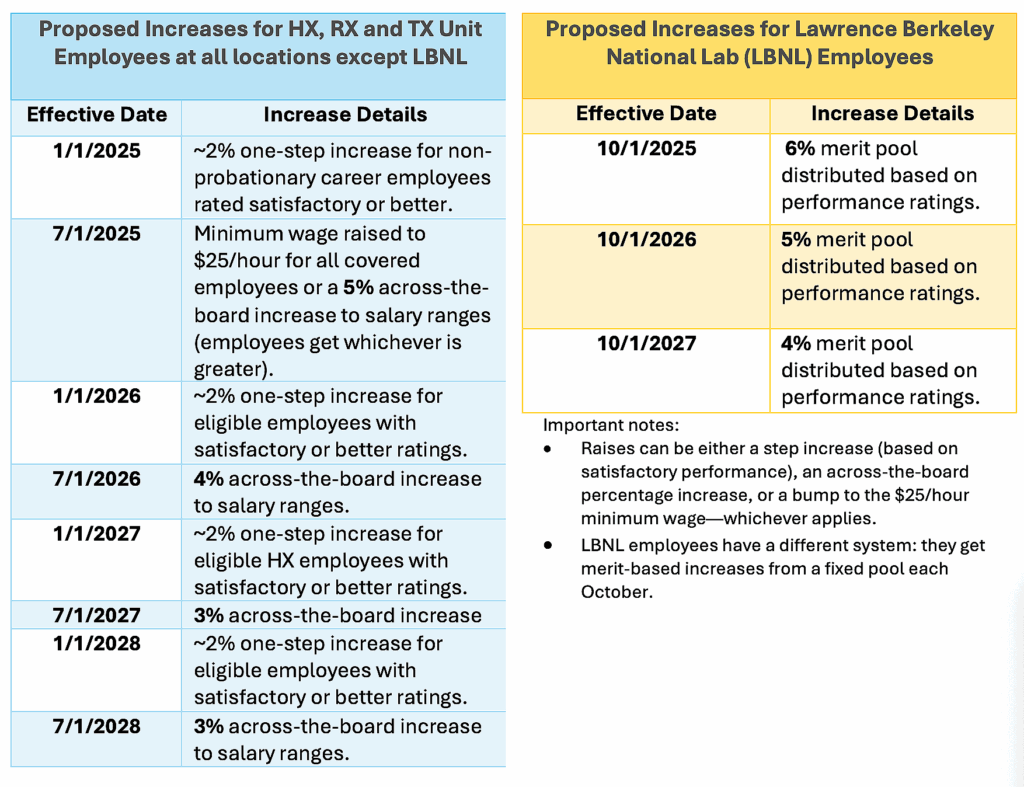FAQs about UC’s Last, Best & Final Offer To UPTE
Share This Article
Q: What has UC proposed to UPTE?
A: After 15 months of negotiations, the University of California (UC) has presented its Last, Best and Final Offer (LBFO) to the University Professional and Technical Employees (UPTE) union. The proposal provides annual wage increases, protections against rising health care costs, and expanded workplace benefits for more than 19,000 UPTE-represented employees.
For full details on the offer, read UC’s press release.
Q: When would the proposed pay raises and step increases take effect? What is the proposed timeline?
A: Proposed dates and increases are below. If you’re paid monthly, your raise will take effect on the 1st of each month. If you’re paid every two weeks, your raise will take effect with the first whole two-week pay period that begins after the 1st.
Q: Why are there only three contract years included for LBNL-based employees?
A: Because LBNL is funded through the Department of Energy, any extension beyond three years requires federal approval. The contract already includes four rounds of across-the-board increases, showing UC’s commitment to sustained wage growth. See the table below for more detail.

Q: What are the financial challenges the University is facing, and how is this different from 2019?
A: Today’s financial climate is very different from 2019, when federal support was more stable. Despite that, UC is offering larger across-the-board increases in this contract than previously offered, demonstrating its commitment to these valued employees. The following expands on several of these areas.
- Federal funding at risk
Facing unprecedented funding uncertainty and with such a large package already proposed, UC cannot offer higher wages. The federal government has suspended research funding at UCLA, is pursuing investigations and actions at all 10 campuses, and recently announced the elimination of funding for grant programs supporting institutions designated as Hispanic Serving Institutions (HSIs), Minority Serving Institutions (MSIs), and Asian American and Native American Pacific Islander-Serving Institutions (AANAPISIs). Many UC campuses hold these designations, which are central to our mission of expanding access for students from all backgrounds. - Threat of a federal government shutdown
In addition, none of the 12 appropriations bills needed to fund the government for the new fiscal year, which starts on October 1, has been signed into law, raising the risk of a federal government shutdown. The administration has proposed significant cuts to many of the agencies and programs important to the University and our community. UC depends on more than $17 billion annually in federal support for health care, research, and student aid. Losing even part of that would mean fewer classes and services, reduced access to health care, job losses, and difficulty retaining top faculty and researchers. - Financial pressures at UC health centers
UC academic health centers are also facing financial pressures, as they must self-fund their ongoing operations and longer-term investments to modernize facilities, retrofit and reconstruct buildings to meet seismic standards, and fulfill retiree pension and health benefits. UC academic health centers do not receive any state support from the general fund and are not-for-profit entities. The centers have sustained financial losses for several years and have just broken even in the past fiscal year, while continuing to make payments toward significant long-term liabilities. - Broader challenges facing higher education
At the same time, UC faces the same pressures affecting many universities — constrained state appropriations, shifts in enrollment, rising healthcare and pension obligations, and one-time costs. Committing to significant new ongoing expenses under these conditions would require deep cuts or unsustainable reliance on reserves. - Moving forward with caution and advocacy
Until these federal issues are resolved, UC must plan cautiously while advocating for funding in Sacramento and Washington, D.C., and bargain in good faith with our union partners.
Q: What did UC propose for market-based equity adjustments?
A: UC has proposed to raise and restructure pay steps across multiple job titles, eliminating lower steps, adding steps at the top, and applying percentage increases to ensure fairer pay scales. These changes mean a higher earning potential, stronger career progression, and recognition of the vital work of UPTE-represented UC employees. A complete list of the proposed job codes, titles, and changes can be found here.
In addition to the changes above, if UPTE accepts this offer, employees will also receive annual step increases to support career growth (each roughly equivalent to a 2% wage increase):
- HX employees: January 2025, 2026, 2027, and 2028
- RX/TX employees: January 2025, 2026, and 2028
Q: What movement has UC made over the course of negotiations?
A: Over the past 15 months, UC has made significant movement at the table. We’ve listened to UPTE’s concerns, responded to feedback, and put forward meaningful proposals beyond what has been offered in past contracts. UC’s offers include larger across-the-board increases, expanded benefits, and new paid time off, all reflecting our commitment to reaching a fair agreement that supports employees’ pay, work-life balance, and career growth.
On wages, UC previously proposed a cumulative amount of 11%, then increased it to 12%, and finally added another 3% for a total of 15% across-the-board wage increases, excluding step increases. UC also added expedited step increases, restructured pay scales, and increased healthcare credits from $75-$100 monthly to $100-$125 monthly. The University also made meaningful movement on issues, including guaranteed vacation, expanded family/caregiver leave, additional sick leave types, the establishment of joint childcare leave committees, expedited processing of reclassification requests, and added an appeal process.
